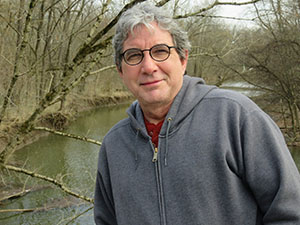THE TRAVELER
★ ★ ★ ★
chimichangaS ON A WINDY DAY

Image by Jordan Whitt
By Tim Clark
Saturday was windy, brutally windy. Branches wheeled through the air with a carefree attitude, feeling the freedom of motion, the magic of flying. If their trip came to a halt in the road, a passing car tire would reduce them to splinters, their brief, glorious escape ending in small piles of kindling.
Trees fell over; occasionally, one would have the coordination to land in the road. People were driving around to snatch them up, chopping them into firewood to sell to tourists. It was an economically depressed area and catering to tourists was a cottage industry. Literally a cottage industry, small roadside homes, with bins in front, stacked to the top with logs, cut into short lengths and split into pieces. Hand-painted signs advertising, “Firewood, $5.00 a bundle, honor system.”
Driving was exciting, winding roads through rugged hills, dodging branches, trees and industrious entrepreneurs with chainsaws and axes. Every corner was another surprise.
When we travel, we always look for small, private restaurants, diners, cafes, little, local places. There is a sense of pride that shines through when the owner is the person taking your order or preparing your meal. Often it is a family business, mom, dad, children, all in pursuit of that elusive goal: a successful restaurant.
We stopped at a small Mexican restaurant for lunch, they spoke and English with difficulty. It was a tiny building. In the center were two rows of tables pushed tightly together. There was a row of booths around the outer walls. Everything was covered in bright, glossy colors, red, blue, green, orange. There were paintings of peasants farming, harvesting agave plants, gauchos with sombreros dancing with women in white, flowing dresses. We’ve been to so many places so similar, it gave us a feeling of familiarity but also a sense of discovery.
Since it was the middle of the afternoon there were only two people working. We had trouble ordering; we wanted to split a chimichanga. It’s a move to save money, control our weight and blood pressure, and keep our doctor and his tenacious nurse at bay. The waiter looked at me as I tried to explain we only wanted one, nodded his head and smiled in a way that didn’t inspire much confidence.
He brought us two chimichangas. He seemed so happy we thanked him and ate what we could.
When we went to pay there was a woman and her son in front of us. The computer to process credit cards had stopped working. The wind had probably taken down a tower, or line or hub or whatever link they use to make our lives easier. The waiter was frantic, trying desperately to get the register to work. Slamming his finger into the button, smack, smack, smack, my finger started to hurt in sympathy.
He talked under his breath in Spanish, so I couldn’t understand what he was saying, but I’m pretty sure he was swearing. There were beads of sweat on his forehead; he wiped them with a towel; it left a shiny film on his skin; it seemed to grow, spreading up into his hair and down onto his cheeks. He looked at the line, four people waiting to pay.
“I’m so sorry,” he said, smack, smack, smack. He clutched a credit card and the woman’s meal ticket in his left hand. He would wave them through the air, by the side of his head, an odd, futile act. Tension ran from the hand that squeezed the ticket through his arm, into his neck and up to his face, you could see the muscles strain. Smack, smack, smack, his finger came down harder on the button, and his face twisted a little tighter.
He leaned closer to the register, his head bowed, maybe in prayer. Maybe he was negotiating with the machine, offering to update the firmware, or get a faster modem, or maybe he was just trying to hide the tears of anger and frustration.
Everyone was quiet, and it was uncomfortable. Wind pushed against the windows, and doors, they moaned and creaked in protest. You could see the dust and grit blowing across the small parking lot and across the highway, eddies formed, little dust devils twisting and spinning and vanishing.
Customers stared into phone screens and said nothing. There was a sense of doom hanging over everybody. Our lives had been put on hold by a freak windstorm and failed technology. We might never escape. It could have been an episode of The Twilight Zone.
Eventually, it became obvious the problems were here to stay, at least for the day. We decided to pay cash. It never really dawned on us that we didn’t have to use a credit card. It’s funny how hard it is to break free from the norm. Habit wraps its arms tight around our lives, an old friend, comfortable like a favorite pair of sandals.
Our bill was slightly more than $21.00; we gave him $25.00 and told him to keep the rest. He smiled and thanked us, in two languages. When we left everybody else was still waiting, held hostage by high winds.
Technology has the power to bring us all together and makes the world a manageable place. It makes life easier. Until it doesn’t. Then we’re at the mercy of our own creation. Most of us. A few hardy souls view the calamity as an opportunity to supplement their income, and they clear the road while they’re doing it. There is a beauty in the process, in the precision, ends and means coming together in the middle of the highway.

Tim Clark lives in Columbus, OH. He is an employee, a husband, a father and a blogger. You can see his blog here, Life Explained. He loves classic rock, and talks about it too often. He loves to write and read, and he doesn’t mind coffee and a little bourbon, either.
























0 Comments